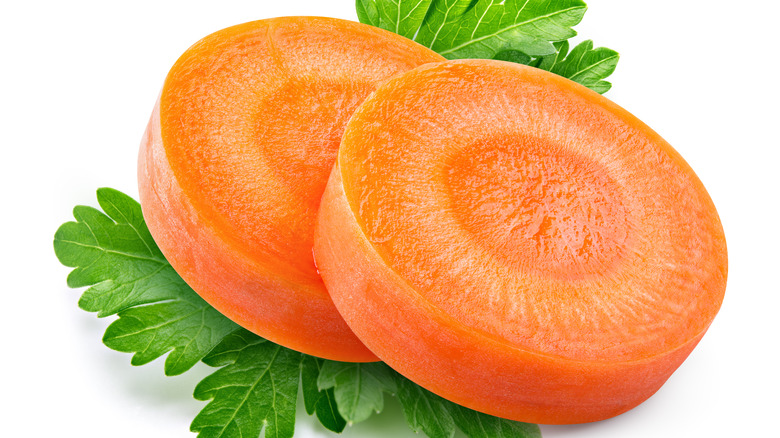How Many Carrots Do You Have To Eat Before Your Skin Turns Orange?
Carrots are a staple in many households, as they can be used in soups, salads, roasts, and even snacked on raw. This orange — and sometimes yellow, white, red, or purple — root veggie is low in calories and loaded with vitamin A, as one carrot provides more than 200% of the daily recommended value (per WebMD). In addition, carrots have been linked to improving eye health and they are rich in fiber, vitamin K1, potassium, and antioxidants, (via Healthline).
With something so tasty and good for you, it can be hard to believe there is a dark side, or in this case, an orange side. Unfortunately, carrots are linked to a generally benign medical condition called carotenemia, which turns the skin a quite unpleasant shade of yellow/orange. Dermatologist Melissa Piliang tells the Cleveland Clinic that carotenemia occurs when there is too much beta-carotene — the pigment in carrots — in the blood steam. Dr. Piliang goes on to say it's a relatively rare condition.
You have to eat a lot of carrots to turn orange
According to HuffPost, carrots aren't the only foods that contain this skin-altering pigment. Eating other foods high in beta-carotene, such as pumpkins and sweet potatoes, can also cause the skin to turn an orangey color. But how much of these foods does a person need to eat before experiencing carotenemia?
According to Dr. Piliang, "You would need to be eating about 20 to 50 milligrams of beta-carotenes per day for a few weeks to raise your levels enough to see skin discoloration" (via Cleveland Clinic). She adds that, "One medium carrot has about 4 milligrams of beta-carotene in it. So if you're eating 10 carrots a day for a few weeks you could develop it."
The condition is not dangerous. Healthline calls it "harmless," and treating carotenemia is simple — just eat fewer beta-carotene-rich foods. On a final note, there are some health conditions that have a similar effect on the skin as carotenemia, including jaundice, diabetes, and kidney disease, so it's important to check with your doctor if you experience a yellow tint to the skin (via Cleveland Clinic).


